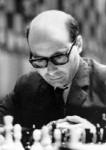
A Creative Genius
David Bronstein a Soviet chess Grandmaster, missed becoming World Chess Champion in 1951. He was one of the world's strongest players from the mid-1940s into the mid-1970s, and was described by his peers as a creative genius and master of tactics. He was also a renowned chess writer.

Growing up in a poor family, he learned chess at age six from his grandfather. He finished second in the Kiev Championship when he was only 15, and achieved the Soviet Master title at age 16 for his second-place result in the 1940 Ukrainian Chess Championship. After completing high school in spring 1941, his plans to study mathematics at Kiev University were interrupted by the spread of World War II throughout Eastern Europe in the early 1940s. Shortly after the war's conclusion, he began attending Leningrad Polytechnic Institute where he studied for approximately one year. Bronstein took many first prizes in tournaments, among the most notable being the Soviet Chess Championships of 1948 (jointly with Alexander Kotov) and 1949 (jointly with Smyslov). Bronstein was also a six-time winner of the Moscow Championships, and represented the USSR at the Olympiads of 1952, 1954, 1956 and 1958, winning board prizes at each of them, and losing just one of his 49 games in those events. Along the way he won four Olympiad team gold medals. In the 1954 team match against the USA (held in New York), Bronstein scored an almost unheard-of sweep at this level of play, winning all four of his games on second board.
Further major tournament victories were achieved at Hastings 1953–54, Belgrade 1954, Gotha 1957, Moscow 1959, Szombathely 1966, East Berlin 1968, Dnepropetrovsk 1970, Sarajevo 1971, Sandomierz 1976, Iwonic Zdrój 1976, Budapest 1977, and Jūrmala 1978.

David Bronstein also wrote many chess books and articles, some of his books are among the very best chess books ever written. As a Chess writer Bronstein seeks to amplify the ideas behind the players' moves, rather than burdening the reader with pages of analysis of moves that never made it onto the score sheet. Bronstein played an exceptionally wide variety of openings during his long career, on a scale comparable with anyone else who ever reached the top level. Bronstein refused to sign a group letter denouncing the 1976 defection of Viktor Korchnoi, and he paid a personal price for this independence, as his state-paid Master's stipend was suspended, and he was also barred from major tournaments for more than a year. He was virtually banned from high-class events for several years in the mid-1980s.

Bronstein was a Chess visionary. He was an early advocate of speeding up competitive chess. In 1973 he introduced the idea of adding a small time increment for each move made, a variant of which has become very popular in recent years and is implemented on almost all digital chess clocks. He challenged computer programs at every opportunity, usually achieving good results.
In later years, Bronstein continued to stay active in tournament play. He maintained a very good standard (jointly winning the Hastings Swiss of 1994–95 at the age of 70) and inspired young and old alike with endless simultaneous displays, a warm, gracious attitude, and glorious tales of his own, rich chess heritage. Bronstein died on December 5, 2006 in Minsk, Belarus of complications from high blood pressure. His last book wasn’t finished when he died.

Today I would like to present to You a game that I consider to be a real masterpiece of creativity. One of my favorite Bronstein’s game that I would like to share with You.


